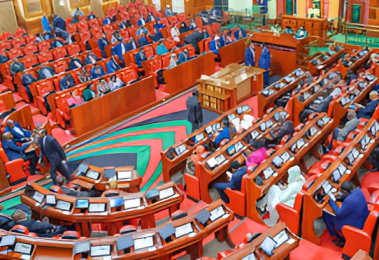18 State corporations set to become public limited companies

Re-registering these corporations as PLCs is expected to give them room to raise capital through the sale of shares on the stock exchange, with shareholders enjoying limited liability.
Eighteen State corporations are set for re-registration as public limited companies (PLCs) under the Companies Act, if Parliament endorses a new Bill that seeks to change their financial and governance structures.
The proposed law, tabled in the National Assembly by Majority Leader Kimani Ichung’wah, lists major government-owned enterprises (GOEs) including the Kenya Ports Authority, Kenya Railways Corporation, Kenya Literature Bureau, Kenya Airports Authority, Agricultural Finance Corporation, Nyayo Tea Zones Development Corporation, and the Commodities Fund.
Others are the Kenya Post Office Savings Bank, Kenya Meat Commission, Kenya Fishing Industries Corporation, National Mining Corporation, Kenya Veterinary Vaccine Production Institute, Kenya Broadcasting Corporation, and the National Cereals and Produce Board.
The Kenyatta International Convention Centre and Agricultural Development Corporation are also targeted for the shift.
“The respective government-owned enterprises provided in the second schedule shall, in exercise of the powers conferred by Section 30 of the Interpretation and General Provisions Act, incorporate in their names a public limited liability company under the provisions of the Companies Act,” said Ichung’wah in the Bill.
Re-registering these corporations as PLCs is expected to give them room to raise capital through the sale of shares on the stock exchange, with shareholders enjoying limited liability.
It would also mean the firms operate more like commercial entities, focusing on profits, self-financing, and accountability to the public through the Treasury.
The Bill also proposes to change the process of creating new government-owned enterprises.
According to the document, a line ministry would begin the process by submitting a proposal to the Treasury, backed by a detailed business case explaining the financial and economic viability of the entity, the intended functions, its impact on government finances, and State shareholding.
“The business case in subsection (3)(a) shall be informed by a feasibility assessment report for the purpose of ascertaining the financial and economic viability of establishing the proposed government-owned entity; whether or not the proposed activity cannot be achieved through an existing government-owned enterprise or through the private sector,” the proposed law states.
If the Treasury finds the plan feasible, it would forward it to the Cabinet for consideration and approval.
“Upon approval of the establishment of the government-owned enterprise by the Cabinet, the necessary establishment process shall be undertaken by the Cabinet Secretary for the National Treasury,” Ichung’wah told the House.
If passed, the Bill will see all newly established GOEs run as profit-oriented companies, with the Treasury retaining oversight and Cabinet holding the final say on their creation.
